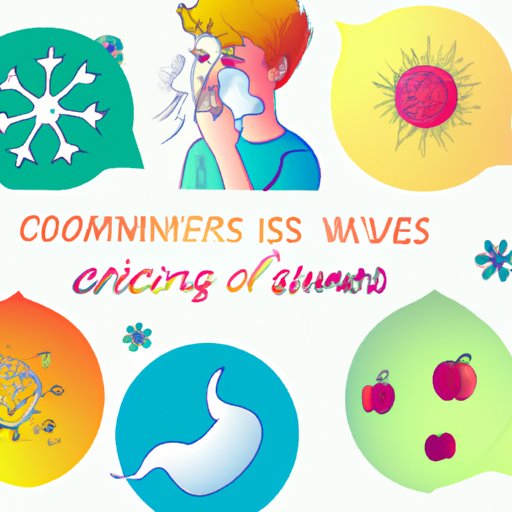
Introduction
For many people, cold and flu season is synonymous with the winter months. However, it is a common misconception that colds and other illnesses only happen when the weather is colder. In reality, it is possible to catch a cold in the summer, as viruses can still circulate even when temperatures are warmer. In this article, we aim to help readers better understand why summer colds occur, and how to prevent and treat them.
Summer Colds: Myths and Facts
Contrary to popular belief, summer colds are not a myth. While it is true that some viruses are more common during colder months, others can thrive in warm and humid conditions. Additionally, factors such as increased travel and higher exposure to germs can contribute to the spread of illnesses during the summer. According to the Centers for Disease Control and Prevention (CDC), the common cold is the most frequent contagious illness in the United States, with adults averaging two to three colds per year and children up to 12.
One common myth surrounding summer colds is that hot weather kills germs, making it less likely to get sick. However, research shows that while high temperatures may affect the survival of some bacteria, it has little impact on viruses, which can thrive and infect individuals year-round, including the summer months.

5 Ways to Prevent a Summer Cold
1. Practice good hygiene. Washing your hands frequently and avoiding touching your face can help reduce the spread of germs. This is particularly important if you are in public spaces or around people who may be sick.
2. Stay hydrated. Drinking plenty of fluids, including water and electrolyte-rich beverages such as coconut water, can help support the immune system and prevent dehydration, which can make it harder for your body to fight off illnesses.
3. Avoid sick individuals. If possible, try to stay away from people who are showing signs of illness, such as coughing or sneezing. If you must interact with them, a face mask could be beneficial.
4. Get enough sleep. Getting adequate rest is an essential aspect of staying healthy. When you are sleep-deprived, your body is less equipped to fight off infections and illnesses.
5. Practice social distancing. As the COVID-19 pandemic has shown, social distancing can also be a beneficial way to avoid catching other illnesses, including summer colds. Avoid crowded places and keep a safe distance from others when you are in public.
The Connection Between Air Conditioning and Summer Colds
As the temperatures rise, many people turn to air conditioning to cool off and stay comfortable. However, air conditioning can contribute to illness if not used appropriately. Cooling systems can dry out the air, which can dry out the mucus membranes in the nose and throat, making it easier for viruses to penetrate. AC filters can also accumulate dust and other debris, which can exacerbate allergies or asthma. In addition, air conditioning can spread germs if not adequately cleaned.
To avoid these issues, it is essential to use air conditioning safely and effectively. This includes changing air filters regularly and setting the temperature to a moderate level, typically around 72 to 78 degrees Fahrenheit. Additionally, taking breaks from AC and getting fresh air can help reduce the risk of illness.
What to Do When You Get a Cold in the Summer
If you do happen to catch a summer cold, there are several remedies that may help alleviate symptoms. Over-the-counter medications such as nasal spray or cough syrup can help relieve congestion or coughs, while sore throats may benefit from honey or throat lozenges. Resting and drinking fluids can also help speed up the recovery process.
It is essential to monitor your symptoms and seek medical attention if they persist or worsen. Your doctor may prescribe antiviral or antibiotic medications that can help treat and manage the illness.
Summer Colds and Allergies: How to Tell the Difference
Cold and allergy symptoms can be similar, making it challenging to know which illness you are experiencing. However, there are a few key differences between the two. For example, colds may cause a fever, body aches, or a productive cough, while allergies tend to cause more nasal and eye symptoms such as itching or sneezing.
If you are experiencing any of these symptoms, it is essential to consult a healthcare provider. They can help determine the underlying cause of your illness and recommend appropriate treatment.
The Science Behind Why We Get Sick in the Summer
Illness and viruses can spread through contact with infected individuals, surfaces, and air particles. During the summer, factors such as increased travel, exposure to new environments, and higher humidity levels can contribute to the spread of viruses and other infections. Additionally, the body’s immune system may respond differently to different types of illnesses, making some more susceptible to infection during the summer months.
Why Your Immune System May be at Risk for Summer Colds
Traveling, changes in diet, and exposure to new environments can impact the body’s immune system, making individuals more vulnerable to illness during the summer. In some cases, pre-existing conditions such as asthma or allergies may also weaken the immune system, increasing the risk of infection.
It is crucial to support your immune system during the summer months. This includes staying hydrated, eating a healthy and balanced diet, and getting enough rest. If you are traveling, be sure to research potential health risks and take preventative measures such as getting vaccinations or bringing medication that can mitigate any health issues.
Conclusion
While summer colds may be less common than their winter counterparts, they are still a real and significant health concern. By understanding why and how summer colds occur, and taking preventative measures such as practicing good hygiene, staying hydrated, and using air conditioning safely, you can reduce your risk of getting sick. If you do experience symptoms, it’s essential to seek medical attention and monitor your health closely. By being proactive about your health, you can enjoy all the summertime activities without worrying about getting a cold.




